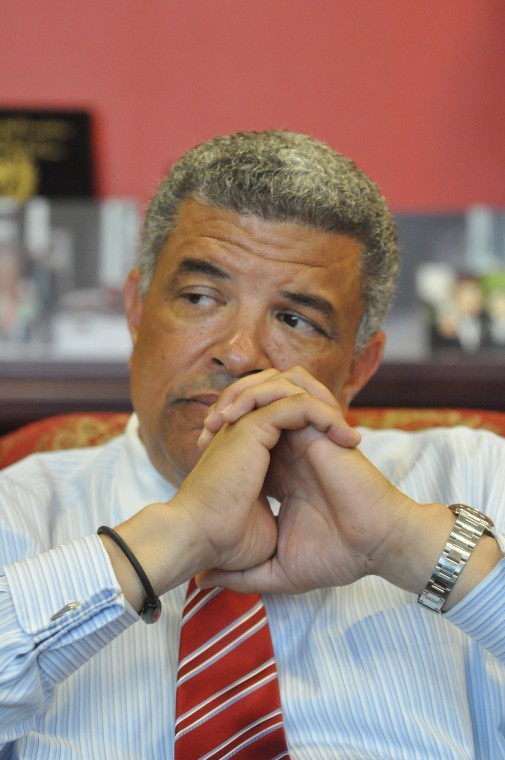
As the Terrapin men’s basketball team faced Duke in March at Comcast Center, profanity-laced cheers directed at the Blue Devils rained down from the student section, the taunts loud enough to be audible on ESPN’s national broadcast of the game.
During the football team’s season opener against Navy a little more than six months later, profanity from the Terps’ student section also made headlines.
Rowdy student behavior at Terp sporting events has often made the university the subject of intense media scrutiny, but school officials said it has also hurt the athletics department in the area where it can least afford it: its bottom line. Season-ticket sales are down in both football and men’s basketball — the department’s two revenue-generating programs — and administrators blame lewd chants and vulgar T-shirts for deterring prospective customers, particularly families, from attending Terp athletics events.
“We’re talking about the bigger picture for the University of Maryland,” Athletics Director Kevin Anderson said in an interview last month. “We’re down in ticket sales, and one of the areas that we’re looking at is our family ticket sales. A lot of the feedback we have received from parents is that they don’t want to bring their children because they don’t want their children exposed to the profanity.”
Asked how the university can combat the profane chants that often arise in Byrd Stadium and Comcast Center, Anderson said the university would not curtail students’ rights to freedom of expression by ejecting unruly students from the crowd.
Instead, he characterized his efforts as a plea to students, hoping they realize their chants are ultimately destructive.
“I’m urging the student body to help us as a department and as a university, that we need to build the ticket base back up,” Anderson said. “And they can help me do that.”
While officials could not say exactly how costly student conduct has been to ticket sales, Vice President for Student Affairs Linda Clement said many families have written to say they would not renew their tickets because of the atmosphere at games.
Junior mathematics major Andrew Triola admits to having taken part in the profane chants and said he realizes how they embarrass the school. Nonetheless, he continues participating.
“I think it’s pretty immature, but at the same time it’s fun,” Triola said. “It definitely makes us look bad, when I consider how the country thinks about us. Even in the short term, I realize that it’s not a good idea. It’s just fun to get into it.”
Anderson and Clement appreciate the feverous support of Terp teams from students, but both expressed a concern it has become more rooted in demeaning the opposition than supporting their own.
“I think the concern I have is fan support here and in other places has taken a turn for the worse,” Clement said. “It’s not just supporting your team; you have to denigrate the other team. And that, I think, is what’s bothering an awful lot of people that I talk to. From regents, to families, to some students.”
“Like I said, I admire and I love their energy, their excitement, their backing of their team,” Anderson said. “But we can do it in other ways.”
Past efforts to limit unruly conduct have not taken hold. The university played a sportsmanship-centered video before football and basketball games that featured former football player Edwin Williams asking fans to “show a little Terpness.”
Though the video is no longer shown before games, the university has again turned to student-athletes to help restrict inappropriate behavior. The Department of Resident Life recently started planning a sportsmanship campaign that will supply dorms with posters featuring current Terps promoting sportsmanship.
“We’re trying to pull together a group of folks to work on a poster campaign where we might feature some of the athletes and hear from them why [sportsmanship] is important and hope that that might resonate with students as opposed to just a poster that says, ‘Don’t do this,'” said South Campus Associate Director Cindy Felice, who added the campaign is planned to start in the spring semester.
And while some students said the chants and T-shirts will continue no matter where the message comes from — “I think kicking people out is the only way they’re really going to get people to stop doing it,” Triola said — Anderson thinks students’ proper conduct is as essential to the department’s success as the players they support.
“I’m just asking people to get on the bus with us and move this thing forward, because there’s more ACC and national championships to win, and we can do it, and we can do it with dignity and respect,” Anderson said. “That’s all I’m asking for. I’m asking for the student body, as being part of the team, to help us accomplish that.”
schneider@umdbk.com



